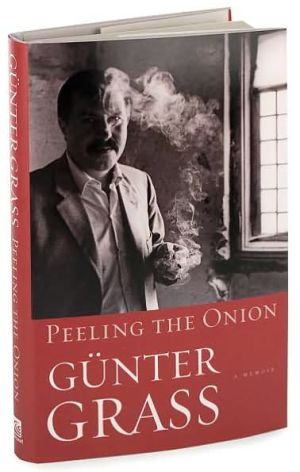

 |

|

The average rating for Peeling the Onion: A Memoir based on 2 reviews is 5 stars.
Review # 1 was written on 2019-01-12 00:00:00 david levy david levyIt must be the onion! Why else would I feel my eyes fill with tears? Finishing the tale of Günter Grass' layers of life, leading to that first sentence, that ominous first sentence that started the Tin Drum, that made Oskar Matzerath the master of the Grassian mind, I feel deeply, deeply touched. Günter Grass grew up in Danzig, but before he published his first masterpiece, the city had ceased to exist in the way he knew it. He was taught to become a faithful member of Hitler's youth organisation, and before finishing school, aged 16, he volunteered to become a soldier, preferably a u-boat hero fed on Schiller's misinterpreted poem that haunted Böll too, to the point of cutting it in half on an imaginary blackboard in front of dying soldiers: "Wanderer, kommst du nach Spa..." Instead of heroic death in the ocean, he was assigned Waffen-SS, and eternal shame once he understood, and took in, what that meant and stood for. Dulce et decorum non est, pro patria vivere! Peeling the onion, he tries to accurately remember his own, individual problems as a teenager in chaos and war, and what comes to light is no grand pathos or big idea, but a threefold HUNGER! First, second and third hunger. The first one not stilled when he attended an abstract cooking class as a prisoner of war, the hunger for food, the basis in Maslow's pyramid. The second, never stilled for long: sexuality awakening to torture and delight and embarrass the young man. The third hunger: for art, for drawing, for sculpture, and later, once the first sentence was found, for literature. A neverending love story. Grass is brutally honest about his inability to remember the boundaries between life and fiction, and consistently fails to see whether a situation is true in the factual sense of the word, or just in the sense that it served as a story to feed and satisfy his most urgent hunger, the third one. His life seems mainly to take place in order to decorate the stories he tells, and not vice versa. Oskar Matzerath is a greater authority in Grass' memory than the boy he once was, and a louder voice and drummer. Reading his autobiography therefore is like reading the biography of his fictional characters, the somewhat awkward real life that was not enough to satisfy the artist's hunger is a sideshow, set at a dramatic time in German history. The reader's hunger only grew while peeling the onion, and the drum sets the pace! |
Review # 2 was written on 2010-05-18 00:00:00 Dave Legend Dave LegendThey had tried doing it by themselves in her room with a cheap onion, but it wasn't the same. You needed an audience. It was so much easier to cry in company. It gave you a real sense of brotherhood in sorrow when to the right and left of you and in the gallery overhead your fellow students were all crying their hearts out. The Tin Drum The Goodreads/Amazon imbroglio only shocked me by being so predictable. Not to sound like a hungover Schopenhauer, but decay and disagreeable ends are to be expected, aren't they? When Herr Grass acknowledged that he'd been in the SS, my knees did feel weak. I did call most everything into question, then I kept on. Grass was in NYC shortly thereafter, he gave a reading from Peeling The Onion and my best friend Joel attended, bought me copy and had the author sign such. I was moved by his memoir. I suffer from being human myself. Dark times place everything in crisis. Normal metrics distort and blur. |
CAN'T FIND WHAT YOU'RE LOOKING FOR? CLICK HERE!!!